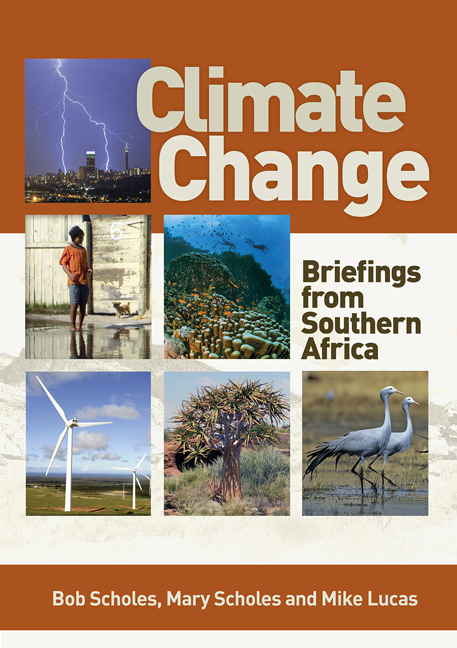Book contents
- Frontmatter
- Acknowledgements
- Contents
- Foreword
- Acronyms and abbreviations
- Preface
- How do governments assess climate change?
- Section 1 Earth system science: The processes that underlie climate change
- Section 2 Consequences of a changing climate for the Southern African environment
- Section 3 Consequences of a changing climate for society
- Section 4 What we can do to avoid and adapt to climate change
- Introduction
- 1 Is it cheaper to tolerate climate change or prevent it?
- 2 Is carbon trading desirable or useful?
- 3 Is it possible to take carbon dioxide out of the atmosphere?
- 4 Could fertilizing the oceans fix climate change?
- 5 Could we reduce incoming solar radiation?
- 6 Are there viable alternatives to coal for South Africa?
- 7 Can nuclear power provide the clean energy we need?
- 8 Can we turn garbage into energy?
- 9 Do biofuels offer a solution?
- 10 Could spekboom save our bacon?
- 11 Can we help plants and animals adapt to climate change?
- 12 Can we build climate-friendly houses and cities? 170
- 13 How can I reduce my carbon footprint? 173
- Codicil Is there a dangerous level of climate change?
- Glossary
- List of figures
- References
- Reading list
- Index
Introduction
from Section 4 - What we can do to avoid and adapt to climate change
Published online by Cambridge University Press: 20 April 2018
- Frontmatter
- Acknowledgements
- Contents
- Foreword
- Acronyms and abbreviations
- Preface
- How do governments assess climate change?
- Section 1 Earth system science: The processes that underlie climate change
- Section 2 Consequences of a changing climate for the Southern African environment
- Section 3 Consequences of a changing climate for society
- Section 4 What we can do to avoid and adapt to climate change
- Introduction
- 1 Is it cheaper to tolerate climate change or prevent it?
- 2 Is carbon trading desirable or useful?
- 3 Is it possible to take carbon dioxide out of the atmosphere?
- 4 Could fertilizing the oceans fix climate change?
- 5 Could we reduce incoming solar radiation?
- 6 Are there viable alternatives to coal for South Africa?
- 7 Can nuclear power provide the clean energy we need?
- 8 Can we turn garbage into energy?
- 9 Do biofuels offer a solution?
- 10 Could spekboom save our bacon?
- 11 Can we help plants and animals adapt to climate change?
- 12 Can we build climate-friendly houses and cities? 170
- 13 How can I reduce my carbon footprint? 173
- Codicil Is there a dangerous level of climate change?
- Glossary
- List of figures
- References
- Reading list
- Index
Summary
Although the future seems fraught with climate risk, it does not have to be as risky as current trends would project. As a species, humans are wonderfully adaptive and have the advantages of foresight and learning, if we care to use them. There are ways for ten billion humans to coexist on Earth at an acceptable and equitable level of comfort, while leaving a large enough share of the planet and its life-support processes to sustain the rich diversity of life forms on which we directly and indirectly depend.
Currently, human development is not on a sustainable path, climatically and in many other respects. A deeply unpleasant future for our children and grandchildren can only be averted by fundamental and sustained changes in the way we live. This will be very difficult to achieve because it falls into a class of problem where collective welfare is in tension with the incentives that drive individual or subgroup behaviour. For example, all the inhabitants of Earth share an atmosphere. Action by any individual to reduce his or her negative effect on the atmosphere comes at some personal cost, but unless the action is simultaneously undertaken by millions of other individuals, there is negligible direct personal benefit. The benefit of individual restraint accrues to everyone, including the freeloaders who continue to pollute.
The only non-disastrous outcome of this kind of challenge is enlightened collective action. This is the objective of the United Nations Framework Convention on Climate Change, where progress is slower than the melting of glaciers. Fortunately, there are many other avenues to supplement international political processes. For example, individual nations and cities are increasingly taking action without waiting for global consensus because their citizens are demanding it, and because they see benefit in becoming pioneers in a new global ‘green’ economy. Private-sector investors are also looking at their portfolios as a whole rather than just at fossil fuel-based assets, and realizing that climate change places many sectors at risk. They are changing their investment strategies accordingly.
Collective action is easier to achieve at a local than a global scale, especially with regard to climate adaptation. This is because, for adaptation actions, the benefits accrue to the people taking the action rather than to the whole world. For example, many cities are showing climate leadership where countries are not.
- Type
- Chapter
- Information
- Climate ChangeBriefings from Southern Africa, pp. 141Publisher: Wits University PressPrint publication year: 2015



